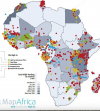27 years after the official end of apartheid in South Africa, blacks represent 57% of those in employment. However, this figure conceals inequalities and an injustice that can negatively impact consumption.
In South Africa, the number of working-age blacks who are unemployed reached 7 million people at the end of June 2021, according to data from the national institution in charge of statistics in the country. When broadened to those not economically active, it rises to 20.88 million people, or an inactivity rate of 65% for black populations between 15 and 64 years old.
The unemployment rate has also increased over the period, but remains at a contained level at only 8.6%. A record level which remains low compared to that of other population groups. Another indicator of the employment figures in South Africa is that of the uneducated and unemployed. They were 18.4 million at the end of June 2021, of which 84.6% were blacks. A ratio that has remained unchanged since 2012.
The covid-19 pandemic is presented as one of the sources of this imbalance due to the slowdowns it has imposed on the South African economy. But an analysis of historical South Africa’s employment figures reveals that the average percentage gap between black and white unemployment is 32.5 percentage points. This situation is likely to create distortions within the South African economy. Its largest group of potential consumers is also the one with the most unemployed people.
27 years after the end of apartheid, the South African government is predominantly black and blacks have a majority in parliament, and the policy of empowering blacks in business continues to unfold. But these different policies do not seem to have completely reversed the trend.
11.26 million black people were in work at the end of June 2021, just over 1 million more than in 2008. But besides that, 5 million more blacks became unemployed over the same period.
































Réagissez à cet article